When I was asked by a prestigious Italian news magazine to write a letter to my daughters – to be published in the first edition of the year – writing about the future, I was not exactly sure of what the content could be. Without worrying too much I accepted, as I consider it a privilege the fact that they had asked me. An astronaut is not an author, but it is important to get out of your comfort zone, and to confront the unknown.
So, between experiments (for which I was the guinea pig) and training sessions – while I was running, swimming and gritting my teeth through strength tests – I thought about my little daughters: how to express something valuable and at the same time comprehensible, now, and in ten or fifteen years, that would not lose value, but rather intensify it with experience?
After two weeks – during which time I was often contacted to know if I was still interested in the collaboration – I understood I was trying too hard to use my brain, and that I was looking for something, as often happens, in the wrong place. Two days before the deadline I sat down at the desk in my hotel bedroom, in a foreign country, on a cold-yet-clear autumn night. I stopped thinking, and I began to write.
To Sara and Maia
The world is incredibly beautiful. Maybe I had forgotten, but I saw it from afar, and now I have proof. But even from up close it can be wonderful, if looked upon with the right set of eyes: eyes like yours, that observe with the gift of curiosity, illuminated by the light of wonder. Eyes that still believe in enchantment, without shame – eyes that understand with no need of explanations.
This is the only world we have, and it contains something extremely precious: our future. Every future is as big as the entire world. The future, just like the world, does not belong to you, yet it is in your hands. It is unique, but it is never the same. It may seem infinite, but it is only infinitely fragile.
I wish I could show you the way to your future, but that is not the role of a father. What I really want to give you instead is the map containing all the roads, so that you can choose your own way.
You are still too young to understand this, but you children are so much richer than us, the grown-ups. You have at your disposal such a capital that the richest of men envy you: time. Recently you started going to school, and without knowing it, you have started investing this treasure of yours, letting it grow by transforming it into knowledge, into experience, into memories. This is the only luggage you may take along with you, while you travel following that map that I would like to give you.
Soon enough you will encounter the first problems, the first challenges: at every junction on that map you will have to depend on what you took with you to choose a road to go down. Initially, there will be no difference: many roads will take you to the same destination and the only thing that changes will be the view, or maybe the distance.
But, sooner or later, the road you choose will diverge from the previous one, irreversibly, and there won’t be many chances to go back. This I have learned: you will have enough time to choose your road. Sometimes, you will discover that the road did not exist until you made the first step. It does not matter. What really matters, the only thing, is that you love to walk. Choose what you love, love what you choose.
And if the going gets rough, when obstacles seem insurmountable, when there is no light to clear the way, remember that at times, you need to be lost in order to find yourself.
Embrace difficulties: they will enrich your road. Look for challenges: they will strengthen your step.
Finally: you will have fellow wayfarers who will at times follow your road, at others stray away, to come back or to forever disappear. You will love their company, you will miss them when they are gone. And if they take with them part of what you carry along, look really well: you will find that nothing is amiss, and that you now have even more.

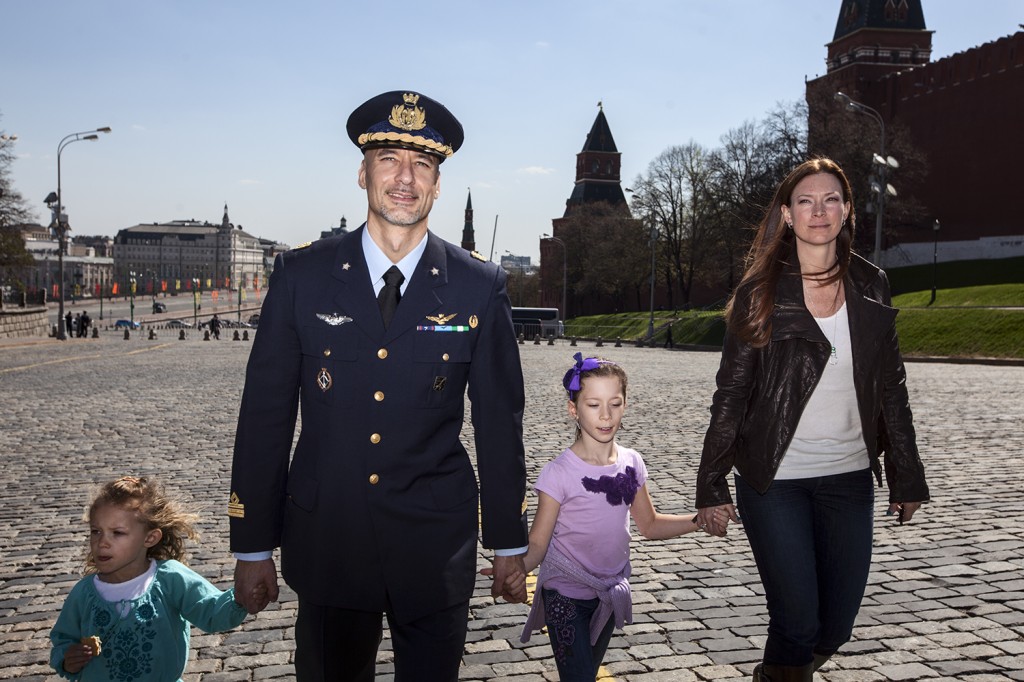
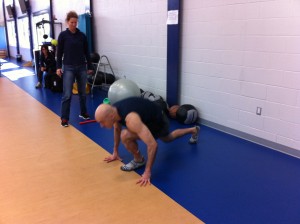
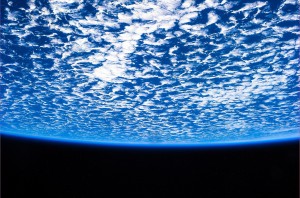
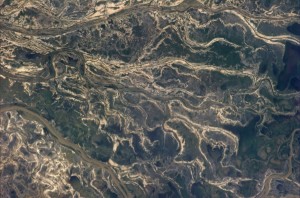
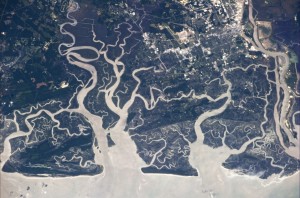
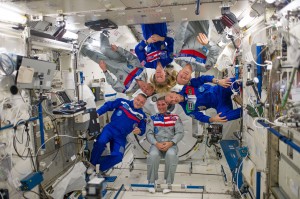


Discussion: 71 comments
Maggiore Luca, siete una splendida famiglia,e la lettera,anche se già la conoscevo,rileggendola,mi ha fatto capire ancora sempre di più l’amore che hai verso la tua famiglia e verso il prossimo,Ciao Comandante.
bellissima lettera Luca. Non cadi nel tranello di raccontare una vita rosa e fiori, cosa che spesso i genitori fanno per non spaventare troppo i figli, ma la realtà è ben altra e tu ne parli… bravo. Io personalmente mi sono commossa.
E tu non saresti un autore?… 🙂
infatti è vero… perchè sei molto, molto di più.
Con affetto, sempre.
Quanto di più dolce e profondo da una persona come lei, e come pochi.. sorprende! In bocca al lupo, non dimentichiamo le immagini stupende dell’ultima avventura
un grande uomo con una grande umiltà …
Noto con chiarezza che il fulcro famigliare c’e ma esiste in tutte le circostanze.quello che mi incuriosisce invece e’ il fatto che la donna che segue questi alti ufficiali ha sempre
L’espressione della vittima..di malumore identificabile dalle foto dimostra
Anche tristezza,rassegnazione e completa sottomissione.questo si evince da tutte le consorti degli alti uffici iali senza esclusione.l.non trovate che sia strano….salvati ermenegildo…
Ps una vita pallosa senza limiti?
Very wise words of choice. You have not chosen ‘The Yellow Brick Road’, you have chosen many roads that children need to walk to reach a destination. Children need guidance and you have provided your daughter’s a chance to understand that life and our planet Earth is fragile. Well done Luca Parmitano.
non ti conosco di persona ma sembri una persona meravigliosa!
Grazie, sei un esempio per tutti noi.
Ancora caro Luca, (se permetti)
Ti ho seguito con interesse, ansia,trepidazione , sempre fidando in te e sicura del tuo agire anche in situazioni estreme. Ti ho seguito perchè amante del mondo e del cielo, e da nonna guardando al futuro delle generazioni. Quando leggevo i tuoi report mi veniva alla mente la letteratura più bella e antiretorica, dalle Opere e i Giorni di Esiodo alle Lettere di Gramsci. E, molte volte ho “incollato” inviando ai miei nipoti perchè leggessero. Con la lettera alle tue figlie hai esaudito anche un mio desiderio, e ancora una volta passerò ai nipoti perchè capiscano quanto è ancora bello il mondo!
Non piango, perché l’ho già fatto da un pezzo.
E questo commento, come detto, lo lascio in punta di piedi. Perché è così che va fatto.
Aggiungere parole a questa lettera non è facile, si ha la sensazione di sminuire, di “violare”, quello che si respira leggendola. Subito, appena l’ho avuta tra le mani, l’ho trascritta e stampata, e mentre digitavo non sai quante volte mi sono fermata a prendere fiato. Ogni volta che la rileggo la reazione è sempre la stessa: senza parole. Un capolavoro. Che segna.
Arriva dritta al cuore, nella parte più fragile di me, e lì si ferma.
E dire che quando l’ho letta la prima volta, il contenuto in un certo senso me lo aspettavo: perché ti conosco… te, il tuo cuore, la tua testa e la tua sensibilità. Il tuo grande bagaglio, che ti ha fatto diventare quello che oggi sei.
Le tue stelline hanno una grande fortuna ad avere te come padre. Lo sanno già, ma lo capiranno ancora di più giorno dopo giorno. Hanno una fonte straordinaria a cui attingere, un grande faro che le illuminerà anche da lontano, una stella che non servirà cercare, che saprà insegnare loro tutto il meglio che si possa augurare. Impareranno dal migliore che sognare è fondamentale, e che credendoci, nessuna meta sarà mai così lontana. Cammineranno tanto lungo il sentiero della vita, consumando tante scarpe, innamorandosi del mondo, e sapendo di poter contare sui loro tesori più importanti: te e Kathy.
Sei una persona straordinariamente Speciale, una pietra preziosa che ha tanto da dare, e loro non saranno da meno…
Raccoglieranno tutto. Prontissime a costruire un ricco, ed entusiasmante bagaglio, con gli stessi occhi incantati di meraviglia del papà. :’)
Già, “un astronauta non è un autore”… non tutti.
Non tutti sono in grado di toccare la corde del cuore come fai tu.
Grazie, per questa splendida lettera che sento anche mia…
Un abbraccio, enorme.
Caro Luca, maggiore, comandante, uomo,
hai scritto delle belle parole che viaggeranno nell’infinito, lo stesso in cui hai lasciato una parte di te, per l’eternità!
Grazie di averci regalato il sogno di galleggiare nello spazio. 😉
Mentre la leggevo mi tornavano in mente le parole di Baden Powell
“Nel vostro passaggio in questo mondo, che ve ne accorgiate o no, chiunque voi siate e dovunque andiate, state lasciando dietro di voi una traccia.
Altri la noteranno e potranno seguirla. Può essere una traccia che li conduce al bene, ovvero può portarli fuori strada. Ciò dipende da voi.
Può darsi che la vostra traccia sia marcata sugli alberi, per renderla visibile a chi vi segue, o invece può darsi che lasciate inavvertitamente delle orme peraltro riconoscibili sulla sabbia.
In un caso come nell’altro, è bene ricordarsi che si lascia sempre qualche tipo di traccia; e quindi, volgendo i propri passi nella giusta direzione, potete indirizzare bene anche coloro che vi seguono.
La vostra traccia è segnata da azioni, dalle frasi che dite e dalle parole che scrivete. Le azioni sono pietre miliari stabilite in modo permanente; le frasi sono soltanto orme che il tempo può alterare o cancellare; le parole scritte sono tacche coscientemente lasciate sugli alberi.”
Lei, Maggiore, ci lascia davvero una bellissima traccia. A Lei ed alla sua splendida famiglia auguro Buona Strada (saluto scout).
Sai sempre volare molto in alto pur rimanendo con i piedi a terra. Sei un esempio per noi ragazzi perché ci fai credere nei nostri sogni!! 🙂 🙂
Buon giorno Luca
ti faccio “solo” i miei complimenti per i pensieri che hai dedicato alle tue figlie
altro non so trovare per esprimere il mio rispetto e ammirazione a persone di valore come te
sei un orgoglio non solo italiano
ma sopratutto sei l’orgoglio delle persone che hanno l’onore di starti vicino
ciao e scusami il tratto confidenziale ..
ciao !
Maggiore Parmitano mi congratulo, non poteva scegliere parole migliori, con la sua lettera ha detto tutto,credo che lei metaforicamente abbia detto quello che ogni figlio/a debba sentirsi dire da un genitore! Congratulazioni lei è una persona straordinaria!
This one is for my 2nd live dog Jijo ( it was my second dog after Jina, the spaniel ). Jijo is Prince Charlie nature, called Japanese Chin all except UK. I think Maia and Sara will be important one day, especially from Marin family. Listen to your greetings:
https://youtu.be/yfVZYFbB1uY
The Agri-culture will be more for this year, I think. We have to take debt as a country after January 🙂
Democratic Libral
sei semplicemente ,grande!!!! questa lettera la conservo e faccio leggere ai miei figli e nipoti…un abbraccio enorme e fraterno a te e i tuoi cari ,anche con te ,sono orgogliosa di essere italiana grazie ..grazie Dio ti benedica e protegga –
Luca è bellissima la leggerò anch’io a mia figlia quando sarà in grado di capirla. Sfrutterò il tuo cuore e la tua generosità nell’aver condiviso con noi queste parole che arrivano dritte all’anima un posto dove forse anche le navicelle spaziali non sarebbero in grado di arrivare.
Ciao Luca, io più volte, sulla tua pagina Facebook, ricordo di averti scritto, tutti i ricordi che sei riuscito a fare riemergere in me e in riferimento a mio padre, il quale non era un pilota, ma amava sinceramente e profondamente il volo. Questo amore per il volo, è rimasto poi intatto, passando attraverso di me e arrivando ai miei figli.
Ricordo anche di averti scritto che tu avresti lasciato un grande patrimonio alle tue figlie e qui non mi riferivo al patrimonio finanziario. Questa tua lettera ne è la piena conferma, ora sono piccole, ma poi cresceranno e capiranno e si ritroveranno ad amare inevitabilmente il volo, fino a trasmettere questo amore ai loro successivi figli. Ecco questo tipo di continuità rappresenta e da contemporaneamente forza e spessore al futuro e anzi è il futuro.
Concludo con un elogio rivolto alla tua capacità comunicativa che ha come fine quello di aprire e di allagare gli spazi della conoscenza, uscendo dal proprio angolo e qui mi permetto di aggiungere anche una valutazione di tipo personale: tu sei principalmente un Astronauta, ma vai tranquillo perché puoi essere benissimo anche un Autore e anzi lo sei!
Che tutti i bimbi possano accogliere questo dono. E splendere.
Grazie Luca.
Carissimo amico,
tu hai il dono di essere immenso… In ogni tua parola, in ogni tuo gesto… Hai la fortuna di avere una famiglia straordinaria e loro di avere un padre e un marito immenso.
I tuoi figli cresceranno bene, perchè hanno un padre meraviglioso, umile, schietto, sincero, onesto, leale, professionale e profondo.
Auguro alle tue bellissime bimbe il meglio dalla vita.
A te e a tutta la tua splendida famiglia, rivolgo un abbraccio sincero e profondo…
Grazie per averci reso partecipe anche di questa lettera.
Con stima ed affetto,
Lino
Dear Maggiore,
ti ho seguito tutta l’estate ,io che sono una viaggiatrice terrestre,leggendo i tuoi pensieri,ammirando le tue foto.Sono una “teacher” ma per tutti sono Alice,per la mia propensione a vivere piu’ con gli occhi insu’ che guardano il cielo e inseguono i sogni piuttosto che fermarmi a guardare le miserie del mondo.Anch’io ai miei studenti parlo sempre del futuro attraversando anche il passato.Nel futuro c’e’ tutto,i nostri progetti del presente e i nostri sogni.Mio padre mi ha insegnato a guardare il mondo cosi’ lasciando libera la fantasia per vivere pienamente la realta’.I’m very proud of you, a true sicilian and italian.Al prossimo viaggio.Io saro’ sempre con te.
luca mi stupisci sempre di più ad ogni tua frase ti stimo e ti ammiro molto e vorrei diventare quello che ora sei tu un astronauta ma anche un uomo di sani principi
What a beautiful letter and sentiment. Kathy and the girls are so fortunate to have you!
Ci sono persone che hanno il dono di trasmetterti emozioni che ti restituiscono alla vita.
Tu sei una di queste, Grazie per aver condiviso con noi il tuo dono.
I tuoi scritti accarezzano l’anima, riscaldano il cuore e fanno volare in alto lo spirito.
Non smettere mai di scrivere.
Un abbraccio alla tua meravigliosa famiglia ,
Con immensa stima, Valeria
Luca, your letter to your daughters is inspirational and beautiful, thank you for sharing this with us. They are lucky girls to have such a wonderful father to guide them through life, with you at their side they cannot fail to achieve whatever they dream of.
GRANDE LUCA, ALTRA PROVA SPECIALE DI QUELLA PERSONA CHE SEI E CHE RAPPRESENTI NEL MONDO. SALUTI DALLA TUA CATANIA
Dear Luca, it was wonderful to read your letter to yor daughters. It clearly came from the heart and expressed, so eloquently, many of the truths that I have tried to pass on to my daughters.
I have missed your posts since you returned from the ISS, but hope that you now are able to spend time with your wife and lovely little girls. Even being an astronaut isn’t as amazing and important as being a good parent.
Kind Regards,
Fran Griffiths
Like I said, dear Luca…..from a woman born with multiple vision challenges, whether you believe it or not, Santa Lucia has worked through you to help us SEE and to give us a new VISION of our universe, politically, environmentally and spiritually. A wonderful melding of Science and Spirituality! Your children are blessed to have such a beautiful couple of parents!!!
Much love to u and yours!!!!
Grazie a Facebook un giorno mi è apparsa sullo schermo una bellissima foto fatta dallo spazio… ho così scoperto il “cuore” di un astronauta che ha poi continuato a regalarmi/ci emozioni attraverso bellissime immagini che parlavano. L’immagine dell’uomo che mi son fatto, viene adesso confermata da questa bellissima lettera. Grazie Luca!
caro Luca,
Grazie per queste belle parole. Sai che farò? le copierò ed archivierò in un luogo sicuro per regalarle tra qualche anno alla mia Giorgina. Hai scritto parole importanti, progetti forti e speranze profonde. Tutti i genitori hanno parole simili dentro sè, ma non tutti le sanno esprimere. Grazie quindi per averlo fatto tu. Te le rubo, contando sulla tua generosità e le serbo per poterle un giorno regalare alla mia bambina. Non sono nate dalla mia mano, ma il mio cuore le condivide appassionatamene.
Un abbraccio alle tue fortunate bambine.
Grazie per questo messaggio di pace, di gioia, di fiducia, di luce…..
L’esperienza nello spazio deve essere stata profondissima e sicuramente la tua missione non è finita…..!
Many blessings (benedizioni) e gratitudine!
Grazie, maggiore… con le sue foto ci ha fatto sognare.
Con le sue parole ci fa commuovere.
Proprio oggi piangevo perché dei delinquenti indegni di appartenere al genere umano hanno ucciso mille ulivi per taglieggiare un’azienda agricola con prepotenza sopraffazione sprezzo della bellezza e della natura.
Il ruolo di un padre oggi deve essere quello di insegnare ai figli che la Terra è la nostra casa bellissima e fragile, che ci è stata donata perché ne avessimo cura.
Il ruolo di un padre oggi è quello di mostrare ai figli la strada, di guidarli, di sostenerli.
Grazie davvero.
Commosso, La ringrazio per avermi dato la possibilità di parlarne con i miei alunni, le mie figlie, la mia famiglia e… con me stesso!
Buon futuro, Comandante!!!
😉
Hermosa carta, un abrazo para usted y su familia: Miriam Marín
bastava che dicessi: seguite l’esempio dei vostri genitori!!! come diceva mio padre : la pera nn cade lontana dall’albero e……………..con mia figlia, ne ho la prova. Cmq, grazie x quello che rappresneti soprattutto per I giovani italiani
Davvero molto belle, profonde e sincere. Ho una bimba di 3 anni e penso che cio’ che possiamo fare x i ns figli, sia provare a dare “il biglietto del treno”, esortandoli a scegliere la destinazione piu’ congeniale. Se un giorno sei a Torino… Sarei entusiasta di poterti stringere la mano e congratularmi per la semplicità con cui fai cose difficili, dalle passeggiate spaziale a scrivere sul futuro per i propri figli.
Lei sa sempre toccare le corde più sensibili. Qualche settimana fa ho “rischiato” di incrociarla di persona, ma purtroppo non è successo. Se e quando accadrà, sarà un onore. Grazie.
Bellissimo gesto d’amore. Parole che si leggono con il cuore. Maria
Grazie ancora per questa meravigliosa lettera, non ci sono parole da aggiungere perché hai detto tutto.
Parli col cuore di un padre ma anche un amico e complice ma sempre genitore, le tue piccole saranno orgogliose di papà il giorno che potranno capire queste parole dettate dall’amore, siete una splendida famiglia!
Un abbraccio, Grandissimo.
Olga
Ciao Luca,
quando fai capolino sulla mia pagina FB mi sorride l’anima perché sono certa che leggerò un’altra chicca preziosa che mi arricchisce e non mi deludi mai.
Sottoscrivo tutto quello che ti hanno scritto, non saprei in quale altro modo esprimere le emozioni che trasmetti. Spero non ti dispiaccia se ricopio la tua lettera per inviarla ai miei nipoti sottolineando che Luca Palmitano l’ha scritta per le sue figlie, ma è come se l’avesse scritta per tutti i giovani che si affacciano alla vita.
Grazie.
………….solo una parola….GRANDE LUCA!!!!!!!!!!!
Grazie infinite!
Well said my friend!
IL TUO SGUARDO FERMO E SERENO, IL TUO SORRISO CONSAPEVOLE, IL TUOI OCCHI SEMBRANO RACCONTARE L’ORGOGLIO DI UNA STORIA RICCA MA DIFFICILE COM’è QUELLA DEL NOSTRO POPOLO ..
Caro Luca…amico che ho incontrato e conosciuto grazie alle immagini splendide che per mesi ci hai regalato e che mi hanno fatto amare ancora di più la nostra meravigliosa terra ….questa lettera è bellissima ed è un dono prezioso che accompagnerà le tue figlie lungo il loro cammino. Mi viene in mente la poesia di K.Gibran dedicata ai figli. Noi non possiamo entrare nel loro futuro, noi siamo l’arco e loro le frecce…l’arco sta fermo nelle mani dell’arciere che può lanciare le frecce dando loro una direzione. La tua mappa appunto. Poi saranno loro, le tue figlie, che man mano faranno le loro scelte e vivranno la loro vita. Ma molto sarà legato alla forza con cui l’arciere lancerà la freccia e alla direzione che imprimerà nel momento del lancio…
Credo che ognuno di noi potrebbe e vorrebbe scrivere una lettera simile a questa ai propri figli e nipoti…Grazie! Un abbraccio grande a te insieme alla tua bella famiglia. Lucia – mamma e nonna!
Semplicemente grazie. Parole che toccano l’anima e che ti fanno venire voglia di mettersi in gioco. In questo mondo competitivo, materialista, fragile e sempre in movimento bisogna non arrendersi anche se tante difficolta’ entrano nella nostra vita. Esse fanno parte del pacchetto, non bisogna vincere, ma bisogna capirle, studiarle e valutarle per imparare come migliorare dai nostri errori di percorso.
Tutte le parole della Treccani per descrivere l’emozione di leggere per la prima volta questa lettera… sono state già scritte!
Grazie, per me è la prima volta, stampo tutto e la passo ai miei figli.
A quando il libro?
Sempre grande Luca… in attesa di Samanta!
grande compà… “u megghiu”= “the best”
Grazie mille Luca,con la paura di non sapere cosa scrivere perchè non è un poeta, alla fine ha scritto una lettera a dir poco da Super poeta,perchè questa meravigliosa lettera è un accenno di tutto l,Amore che un genitore prova per i propri figli, con il suo percorso di vita fino ad oggi e per il futuro lei potrà insegnare ancora solo cose stupende alle sue figlie e tutti quelli che inseguono una passione cosi importante.La sua famiglia deve essere Orgogliosa e noi Siciliani di più,le Auguro tanta felicità e gioia per quello che farà e che ha fatto.Auguri per la bella famiglia .
essere genitori non è per niente facile; instaurare un sereno dialogo con i figli è la cosa più bella del mondo.
complimenti per tutto, per le splendide immagini che ci hai regalato dallo spazio e la limpidezza dimostrata come uomo.
grazie
vincenzo
Grande Luca stupende parole….con la pelle d’oca ripenso, attraverso le tue parole, alle persone ed alle esperienze fatte in passato e non nascondo di aver faticato a trattenere le lacrime. Continua così 🙂
ciao luca , amico sorprendente che ho conosciuto grazie a persone speciali che hanno avuto il piacere e l’onore di conoscerti da quando eri un ragazzo siciliano pieno di speranze e sogni . grazie per le foto che hai scattato della nostra meravigliosa terra . grazie per le parole meravigliose che hai scritto per le tue bambine ma che sono un esempio per tutti . ma sopratutto grazie di essere così speciale e nello stesso tempo così: ” uno come noi ” .
Bonjour Luca
Au risque de vous contredire, vous inventez votre vie et vous êtes un auteur. Les mots pour nous la décrire sont des mots de sagesse avec une pointe d’humour qui met du sel pour ceux qui la partage pour une heure, un jour ou toute une vie.
Très troublant cette impression que l’on vous connaît depuis toujours. Descartes c’est chouette
Merci encore pour ce partage
Cordialement
Caro Luca! Riconosco in te a Lightworker e adesso che mi fermo un momento per contattarti, il mio cuore e’ colmo di emozioni. Tu ami e usi le immagini per comunicare, per me, il medium sono le parole. Nella loro imperfezione rappresentano la metafora perfetta della vita. Nella ricerca, a volte agonizzante della parola giusta, si riflette per me, l’esperienza terrena.
Sono la fondatrice di “Get Your Wellness On” Indossa il Tuo Benessere. Un movimento creato/nato in risposta al suicidio di figlio. Il mio bellissimo Andrew, studente ventenne Orientalista alla prestigiosa New York University (NYU), ando’ incontro alla morte nelle ore che precedono l’alba. Alle 4:30 del mattino di Martedi’, Novembre 3, 2009, Andrew si butto’ dal decimo piano di Bobsts, l’iconica biblioteca di NYU. Dall’Anno scorso, con il Patrocinio del Comune di Palermo e il sostegno del Sindaco Leoluca Orlando, ho organizzato la prima edizione di GYWO in Italia sul modello dell’evento annuale che organizzo a Manhattan. L’evento di Palermo ha avuto cosi’ tanto successo che mi e’ stato chiesto di rifarlo quest’anno. La seconda edizione di Indossa il Tuo Benessere, e’ prevista per Domenica 1, Giugno. E io vorrei tanto, tanto che tu possa venire! I bambini delle comunita’ (in foster care) saranno felicissimi. Il campione di Scherma, Martino Minuto, per esempio, verra’ a passare la giornata con noi e a insegnare a chi vuole, un po’ di scherma. Tu potresti venire a farci sognare, a insegnare l’importanza di prenderci cura del pianeta che si prende cura di noi.
La missione di Get Your Wellness On e’ la seguente:
Mission Statement
IF YOU ARE FEELING SUICIDAL OR WANT TO TALK CALL THE NATIONAL LIFELINE
1-800-273-8255
Mission, Vision and Goals
“Get Your Wellness On” is a grass-roots movement to promote health and save lives. Encouraging dialogue and education to reduce incidence of mental illnesses that can lead to suicide, “Get Your Wellness On” promotes Eastern and Western approaches to mind and body health. The movement advances a general understanding of wellness that will empower individuals to take charge of their overall health.
Wellness through education, dialogue, openness, understanding and action is promoted through:
Get Your Wellness On Suicide Awareness & Prevention Fairs as far and wide as possible
Blogging
Advocacy
Peaceful Communications
Promoting 24-hour hotlines (in some countries they are very sketchy)
Collaboration with suicide prevention organizations such as the AFSP, media, and legislators
The Share Your Story initiative
In addition, the founder, activist and writer Esmeralda Williamson-Noble, whose twenty-year-old son Andrew died of suicide on November 3, 2009—along with volunteers of Get Your Wellness On—are available for interviews, workshops and panel and discussion forums.
Target Population
• Survivors
• University students, staff & administrators
• Parents of school-age children – The earlier the start, the greater the Wellness
• Anyone who is struggling or has struggled with depression, suicidal thoughts and who may be at risk of suicide
Lo so che sto scrivendo assai, come si dice in Siciliano (sono Siciliana anch’io), ma adesso ho finito. Spero che tu voglia e possa darci una mano d’aiuto nell’esporre la gravita’ della sofferenza mentale che porta al suicidio.
Quella che segue e’ la lettera che ho scritto a mio figlio una settimana DOPO la sua morte:
My Darling Andrew,
Disperata, nel mio sonno disarticolato, in vano ho cercato di intercettarti nelle buie, sonnolenti strade di Manhattan …
Figlio del mio grembo, quando eri vivo ho dimenticato di dirti che al mondo non c’e’ donna, uomo o bambino che a volta non voglia morire …
Quando eri piccolo tenevo la tua piccola mano duranti I tuoi primi passi incerti,
quando salivamo una scala o attraversavamo la strada … ti tenevo forte per le tue prime pedalate in bicicletta …
Ma non ti ho messo in guardia contro I pericoli della mente!
Chi mai sapra’ quali feroci draghi e demoni in quante battaglie hai affrontato e combattuto, coraggioso ma solo? Non lo sapro’ mai perche’ li hai distrutti insieme con te.
Ma non il mio amore! No, bimbo mio guerriero, il mio amore no, perche’ l’amore non muore mai.
Milioni di lacrime inondano il mio seno e il grido primordiale squarcia il mio corpo.
Ma non ti giudico amore mio, perche’ l’amore permette all’amore di essere.
La Fonte dell’Amore Universale non smette mai di scorrere per me, o per te.
Ma adesso, Angelo mio piccolo, bambino mio adorato, non preoccuparti, riposa sereno, vedrai, ce la faremo, supereremo anche questo… Figlio della mia anima, Milite caduto al fronte della vita, io ti saro’ sempre accanto. Ma quando arrivera’ il mio momento, ti prego, vieni tu a farmi strada.
La Mamma
Guardo spesso le stelle di notte sono un fotografo ed un padre con speranze paure e tante emozioni. Ti ammiro sei il nostro ORGOGLIO Italiano, semplice ,tenace,e sopratutto credo un grande padre e sicuramente un ottimo marito.
Ti dedico questa mia foto
https://www.flickr.com/photos/maw78maw/9513629581/
Ciao
Buona vita
Giovanni Maw
Hermosa carta que tus niñas apreciaràn orgullosas y en su verdadera dimensiòn cuando crezcan. Gracias por compartirla
Grazie papà Luca, che hai camminato a testa in giù sopra di noi, che insegni la libertà alle tue figlie, la fantasia, l’amore per la conoscenza. Vorrei aver avuto anch’io come papà uno come te, affettuoso, premuroso, vicino eppure rispettoso delle mie scelte. Una unica raccomandazione, te la voglio fare da mamma quale sono: abbi cura di tua moglie perchè è soprattutto attraverso l’amore per lei – espresso e concreto – che alle tue bambine insegni l’amore per il mondo.
Carissimo……leggo una persona di profondi sentimenti…..il mondo avrebbe bisogno
Di tante persone scintillanti come te!!!! Che emanano luce da tutte le parti….. per contribuire a formare generazioni…… che poi saranno parte del nostro Futuro……..
Anch’io ho avuto un papà Grande….. che anche con pochissima cultura, ma con grande
intelligenza, con poche parole e’ stato capace di illuminare la dritta via nella quale mi sono incamminata….. Uomo di grandi orizzonti…. aveva scelto di portare tutta la sua
Famiglia, nel 1969 lontano dal suo (stretto) paesino natale….. …..
Erano i tempi di quando l’Apollo 11 aveva compiuto la sua missione sulla Luna,
Facendomi. Sentire molto da vicino …. Lì in America …. Tutta la magia di quei momenti, visto che già a 5 anni lo spazio cosmico mi affascinava tantissimo……
Precisamente ero a Caracas, e forte era sentita e vissuta questa missione dall’opinione pubblica.
Non so cosa sarò capace di trasmettere si mie figli che per certo penso non siano molto fortunati……visto che si ritrovano a vivere in Italia, con un padre molto, ma molto superficiale e vuoto a tal punto che tanto fango a saputo spargerci addosso,
portando alla luce una relazione extraconiugale con la cognata che vive ad un piano
di istanza dello stabile ( moglie di mio fratello) .
Che pensi? sapresti illuminarmi? Visto che mi tocca ricominciare il tutto? con due ragazzi di 21 e 15 anni……
Spero tanto in una tua risposta……. Grazie Luca…..
Oh my goodness SuperHermano Luca.
I’m so touched by your beautiful letter to your beloved daughters.
I admire and respect you as a father and husband.
I’ve no kids, so i’ve no experience being a father.
You’ve shown your daughters Sara and Maia the most important
ways of life. And i’ve learned a lot from you too.
Thank you from the bottom of my heart for sharing this wonderful
letter to your daughters with us.
We’re your family too, SuperHermano. Be always happy.
God bless you all.
Ciao Luca, sono emozionatissima a leggere questa lettera per le tue figlie.Sei un GRANDE PADRE, e da persona “diversamente giovane” sono contenta quando in qualsiasi famiglia regna l’Amore.
Mi hai emozionata quando mi hai risposto “da lassù”, correggendomi quello che avevo scritto, ma io mi sono giustificata che essendo anziana, certe cose non Le sapevo.
Ti AMMIRO tantissimo.
Avrei voluto per mio figlio un padre come te, invece l’ho cercato per mari e monti, sbagliando probabilmente tanto, e poi sono andata a Barcellona da sola, iniziando così il più bel viaggio della mia vita.
Credo fermamente che sia meglio per lui non avere un padre accanto, che averne uno che faccia danni. Ma sente la mancanza, e se me lo permetti, stamperò questa tua lettera per lui, e glie la leggerò quando sarà più grande, per aiutarlo a immaginare e creare dentro di sé un’idea di padre che possa ispirarlo nel suo cammino. Perché credo che sia il più grande dono che si possa fare a un figlio, insegnargli pian piano ad aprire il suo cuore al mondo ed ad essere capace di sentimenti profondi.
Grazie dal più profondo del cuore
Paola
Grazie Luca, la leggerò certamente anche ai miei figli.
Un abbraccio a te e alla tua famiglia.
Caro Luca, sebbene io abbia già conosciuto la tua sensibilità e generosità (“..l’haiku!..”), mi hai sorpresa un’altra volta: come ho già avuto modo di dirti, sei una persona veramente speciale, un grande.
Mia figlia, 21enne al secondo anno di università, vorrebbe fare la giornalista e, con la sua profonda sensibilità e passione, ha già pubblicato 13 articoli. Cionondimeno le farò leggere la tua bellissima lettera a Sara e Maia.
Un abbraccio, facendo sempre il tifo per te, Luisa
Buonasera Maggiore,
questa lettera arriva dritta al cuore perché è stata scritta con il cuore, lo si percepisce.
Da figlia avrei tanto voluto riceverla, da mamma avrei tanto voluto scriverla.
Le tue bambine sono fortunate ad averti come papà.
Grazie di averla condivisa con tutti noi ^_^
Caro Luca, i miei bambini ed i loro genitori ti stanno seguendo assieme a noi insegnanti fin dal primo giorno di scuola. Le tue foto ed i tuoi messaggi sono stati preziosissimi per avvicinarci al tema dello spazio con passione, ma anche per sognare, per stimolarci ad osservare col cuore ciò che ci circonda. Le tue riflessioni fissate sulle pareti dell’aula, sulla porta della scuola, sull’albero di Natale, rimbalzate via mail, sono state vissute dai bambini come pensate appositamente per noi ed i bambini ci hanno contagiato con il loro entusiasmo, la loro gioia, il loro coinvolgimento, come solo loro sono capaci di fare. Sei ormai il loro amico Luca, e le parole di un amico così importante valgono molto, molto di più, per loro e per chi li ama: grazie.
“Abbracciate le difficoltà” è troppo, troppo bello!
Carissimo Luca
questo è uno straordinario messaggio scritto e raccontato con il cuore.
Pieno di speranza e di coraggio.
Una lettera straordinaria.
Ele
Awesoooommeee letter……!!!
“Embrace difficulties: they will enrich your road. Look for challenges: they will strengthen your step.”
What a great practice is this….!!!
Hats off to U, Sir….! Thanks a lot for the marvelous words……:)
Bellissimo messaggio! Scritto con il cuore! Complimenti!
Amazing letter, wish I had written that. Congratulations.
Nothing to add;
nothing to say;
nothing to except.
Just the joy to share every word, the admiration for the Man who wrote them, and the proud to be a human being, as you are.
Thanks Major.
Remo